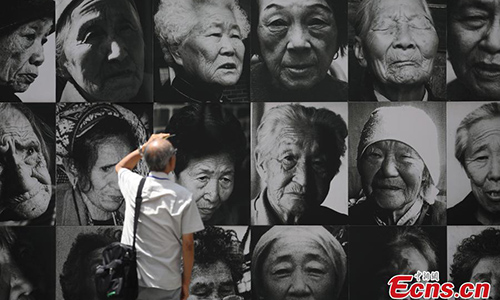
Descendants of 'comfort women' victims file lawsuit against Japanese government in China for first time

The children of 18 Chinese victims of the "comfort women" system during the Chinese People's War of Resistance Against Japanese Aggression (1931-45) have recently filed a lawsuit against the Japanese government. This marks the first time in 32 years that civilians have sued the Japanese government in a Chinese court for wartime atrocities.
Last week, the 18 plaintiffs filed the lawsuit with the Shanxi Provincial High People's Court in North China. This is the first time that these Chinese women, who were forced to act as sex slaves for Japanese soldiers, have filed a lawsuit in China. It will also be the first time in Chinese civil litigation that a foreign government has been named as a defendant, the lawyers representing them told the Global Times on Thursday.
The recently filed lawsuit was largely inspired by a similar case in South Korea. In 2021, a Seoul court ordered the Japanese government to compensate each "comfort woman" with 100 million Korean won ($72,490). Zhang Shuangbing, who has long been concerned about the rights and compensation of the "comfort women" and their descendants in China, contacted lawyers and proposed launching a similar lawsuit in China. After careful consideration, a legal team led by lawyers Jia Fangyi and Guo Chengxi believed that the plan was feasible and should be pursued.
The plaintiffs in this case are the children of 18 "comfort women" victims. Some of them participated in a lawsuit against the Japanese government in 1995 regarding this case in Japan. Although the judgment at that time was not satisfactory, the Japanese court acknowledged the fact that the Japanese army had harmed civilian women in China, which is very important, Jia told the Global Times on Thursday.
As early as 1992, the Chinese victims formally filed a complaint with the Japanese government, demanding a public apology and economic compensation. The case was officially heard in a Japanese court on August 7, 1995. With the help of Japanese lawyers, the case went through dozens of hearings from 1995 to 2007. Ultimately, the Japanese court ruled to acknowledge the historical facts but did not require a public apology or provide economic compensation to the victims.
"Law is the most fundamental rationality of humanity," Jia said. "We are filing this lawsuit today because the then-Japanese government caused immense harm to Chinese civilians during the war, especially to the human rights of women civilians, but justice has never been served."
He pointed out that although international treaties stipulate compensation from government to government, this is not contradictory to compensation demanded for harm to civilians during war.
"If this incident cannot be resolved at the legal level, it could continue to damage the self-esteem and national dignity of the Chinese people," Jia told the Global Times.
The lawyers also hope that this attempt will establish a precedent for China to use its own legal system and domestic laws to resolve compensation issues in cases where foreign governments violate the personal rights of Chinese citizens.
All the 18 "comfort women" victims in this case have passed away. The victims' names were Zhao Runmei, Liu Mianhuan, Zhang Xiantu, Wang Gaihe, Yang Xihe, Hou Qiaoliang, Wan Aihua, Chen Lintao, Hou Dongtao, Gao Yine, Yang Shizhen, Zhou Xixiang, Yin Yulin, Nan Erpu, Zhao Cunni, Zhang Gaixiang, Guo Xicui and Li Xiumei.



